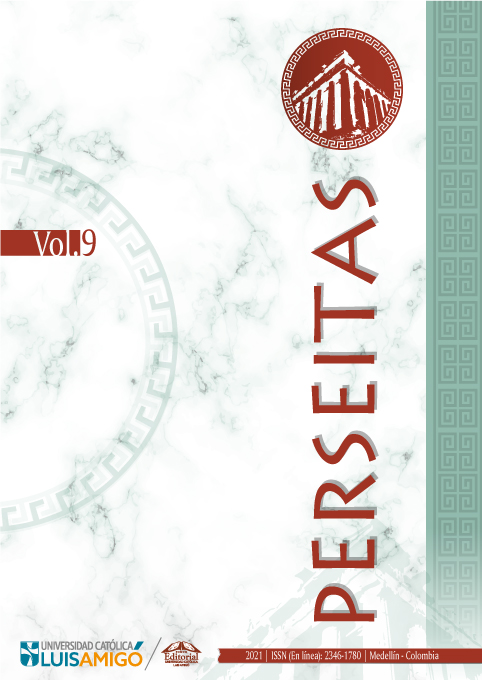Transhumanism, question to human nature
DOI:
https://doi.org/10.21501/23461780.3981Keywords:
Transhumanism, Ecological subject, Technology, Society, Human natureAbstract
Transhumanism as a philosophy and technological ideology is increasingly adept and placed in academic fields as a positive, possible and desirable position. Its implementation is overlapping in a daily life that depends, as never before, on technological advances. The position we will take is that this ideology, which overstates the role of technology in society, has a limited view of the ethical, economic and social conflicts that come from its budgets. The problem is not to deny technology but what role it plays in the construction of society. Transhumanism may be selling a false dream of freedom, where uniformity, lack of criticism, discrimination and radical separation between the poor and the rich define that paradoxical world it proposesDownloads
References
Ballard, D., Hayhoe, M., & Rao, P. P. (1997). Deictic Codes for the Embodiment of Cognition. Behavioral and Brain Sciences, 20(4), 723-767.
Bateson, G. (1972). Steps to an Ecology of mind. Collected Essays in Anthropology, Psychiatry, Evolution, and Epistemology. Chandler Publishing Company.
Beer, R. D. (1995). A dynamical systems perspective on agent-environment interaction. Artificial Intelligence, 72(1-2), 173-215.
Blake, C., Molloy, C., & Shakespeare, S. (Eds.). (2012). Beyond Human. From Animality to Transhumanism. Continuum International Publishing Group.
Bostrom, N. (2007). In Defense of Posthuman Dignity. Bioethics, 19(3), 202-214.
Bostrom, N., &. Savalescu, J. (2017). Mejoramiento humano. Teell Editorial.
Braidotti, R. (2013). Lo posthumano. Editorial Gedisa S.A.
Brooks, R. (1997). Intelligence without Representation. En J. Haugeland (Ed.), Mind Design II. Philosophy, Psychology, Artificial Intelligence (pp. 395-420). MIT Press.
Chalmers, D. (2012). A Computational Foundation for the Study of Cognition. Journal of Cognitive Science, 12(4), 323-357.
Church, A. (1937). Review of Turing 1936. Journal of Symbolic Logic, 2, 42-43.
Clark, A. (2008). Supersizing the Mind. Embodiment, Action, and Cognitive Extension. Oxford University Press.
Clark, A., & Chalmers, D. (1998). The Extended Mind. Analysis, 58(1), 7-19.
Clark, A., & Grush, R. (1999). Towards a Cognitive Robotics. Adaptative Behaviour, 7(1), 5-16. http://wexler.free.fr/library/files/clark%20
%281999%29%20towards%20a%20cognitive%20robotics.pdf
Constant, A., Clark, A., & Friston, K. J. (2021). Representation Wars: Enacting an Armistice Through Active Inference. Frontiers in Psychology, 11.
Cordeiro, J. L., & Wood, D. (2018). La muerte de la muerte. Centro Libros PAPF.
De Grey, A. (2013). El fin del envejecimiento. Lola Books.
Delgado, C. (1999). El cambio de racionalidad y la matematización del saber. Revista Colombiana de Filosofía de la Ciencia., 1(1), 63-83.
Delgado, C. J. (2007). Hacia un nuevo saber. La bioética en la revolución contemporánea. Editorial Publicaciones Acuario.
Drexler, E. (1986). Engines of Creation. The Coming Era of Nanotechnology. Anchor Books.
Fernández, G. (2018). La metáfora como proceso cognitivo [Tesis doctoral]. Universidad de La Habana, La Habana, Cuba.
Ferry, L. (2017). La Revolución Transhumanista. Como la tecnomedicina y la uberización del mundo van a transformar nuestras vidas. Alianza Editorial.
Fodor, J. (1987). Psychosemantics. MIT Press.
Fodor, J., & Pylyshyn, Z. W. (1988). Connessionism and Cognitive Architecture. A Critical Analysis. Cognition, 28(1-2), 3-71.
Fukuyama, F. (1989). ¿El fin de la historia? The National Interest, (16), 3-18.
Fukuyama, F. (2002). El fin del hombre: consecuencias de la revolución biotecnológica. Editorial B.
Habermas, J. (2001). El futuro de la naturaleza humana. ¿Hacia una eugenesia liberal? Editorial Paidós.
Hottois, G. (2016). ¿El Transhumanismo es un humanismo? Universidad El Bosque.
Kurzweil, R. (2012). La Singularidad está cerca. Cuando los humanos trascendamos la biología. Lola Books.
Lee, N. (2019). The Transhumanism Handbook. Springer.
Lida, F., & Pfeiffer, R. (2006). Sensing through body dynamics. Robotics and Autonomous Systems, 54(7), 631–640.
Lilley, S. (2013). Transhumanism and Society: The Social Debate Over Human Enhancement. Springer.
Lungarella, M., &. Sporns, O. (2006). Mapping information flow in sensorimotor networks. PLoS Computational Biology, 2(10), 1301-1312.
Manzocco, R. (2019). Transhumanism–Engineering the Human Condition: History, Philosophy and Current Status. Springer Praxis Books.
Marcos, A. (2018). Bases filosóficas para una crítica al transhumanismo. ArtefaCToS. Revista de estudios de la ciencia y la tecnología, 7(2), 107-125.
Marcuse, H. (1966). El Hombre Unidimensional. Ensayo sobre la ideología de la sociedad industrial avanzada. Editorial Instituto del Libro.
Marx, C. (1965). Manuscritos Económicos Filosóficos de 1844 . Editorial Política.
Maturana, H., & Varela, F. (1984). El árbol del conocimiento. Las bases biológicas del entendimiento humano. Lumen; Editorial Universitaria.
Milner, D., & Goodale, M. (1995). The Visual Brain in Action. Oxford University Press.
Neisser, U. (1993). The Perceived Self. Cambridge University Press.
Pilsch, A. (2017). Transhumanism. Evolutionary Futurism and the Human Technologies of Utopia. University of Minnesota Press.
Putnam, H. (1975). The nature of mental states. En H. Putnam (Ed.), Mind, Languague and reality: Philosophical Papers (vol. 2, pp. 429-440). Cambridge University Press.
Ranisch, R., & Lorenz, S. (2014). Post- and Transhumanism. An Introduction. Frankfurt am Main; Peter Lang Edition.
Sandel, M. (2007). The case against Perfection. Ethics in the Age of Genetic Engineering. Harvard University Press.
Savalescu, J. (2012). ¿Decisiones peligrosas? Una bioética desafiante. Tecnos.
Searle, J. R. (1997). Minds, Brains, and Programs. En J. Haugeland (Ed.), Mind Design II. Philosophy, Psychology, Artificial Intelligence (pp. 183-204). MIT Press.
Terrones, A. L. (2019). Una aproximación general al transhumanismo y su problematización. Análisis, 51(95), 319-345.
Tirosh-Samuelson, H., & Mossman, K. (2012). Building Better Humans? Refocusing the Debate on Transhumanism. Frankfurt; Peter Lang.
Turing, A. (1950). Computing Machinery and Intelligence, Mind, 59, 433-460.
Valdés, C. (2005). La educación ambiental y la ética ambiental: Reflexiones desde Cuba. En C. Valdés Menocal (Comp.), Selección de Lecturas Ecología y Sociedad, pp. 180-197. Editorial Félix Varela.
Van Gelder, T. (1995). What Might Cognition Be, If Not Computation? Journal of Philosophy, 92(7), 345-381.
Velázquez, H. (2009). Transhumanismo, libertad e identidad humana. Thémata. Revista de Filosofía, (41), 577-590. https://revistascientificas.us.es/
index.php/themata/article/view/594
Wilson, R. (2004). Boundaries of the mind: The individual in the fragile sciences—Cognition. Cambridge University Press
Published
How to Cite
Issue
Section
License
Copyright (c) 2021 Perseitas

This work is licensed under a Creative Commons Attribution-NonCommercial-NoDerivatives 4.0 International License.
La revista y los textos individuales que en esta se divulgan están protegidos por las leyes de copyright y por los términos y condiciones de la Licencia Creative Commons Atribución-No Comercial-Sin Derivar 4.0 Internacional.
















